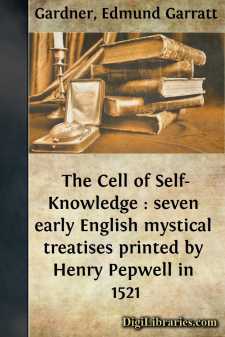Categories
- Antiques & Collectibles 13
- Architecture 36
- Art 48
- Bibles 22
- Biography & Autobiography 813
- Body, Mind & Spirit 142
- Business & Economics 28
- Children's Books 15
- Children's Fiction 12
- Computers 4
- Cooking 94
- Crafts & Hobbies 4
- Drama 346
- Education 46
- Family & Relationships 57
- Fiction 11829
- Games 19
- Gardening 17
- Health & Fitness 34
- History 1377
- House & Home 1
- Humor 147
- Juvenile Fiction 1873
- Juvenile Nonfiction 202
- Language Arts & Disciplines 88
- Law 16
- Literary Collections 686
- Literary Criticism 179
- Mathematics 13
- Medical 41
- Music 40
- Nature 179
- Non-Classifiable 1768
- Performing Arts 7
- Periodicals 1453
- Philosophy 64
- Photography 2
- Poetry 896
- Political Science 203
- Psychology 42
- Reference 154
- Religion 513
- Science 126
- Self-Help 84
- Social Science 81
- Sports & Recreation 34
- Study Aids 3
- Technology & Engineering 59
- Transportation 23
- Travel 463
- True Crime 29
The Cell of Self-Knowledge : seven early English mystical treatises printed by Henry Pepwell in 1521
Description:
Excerpt
FROM the end of the thirteenth to the beginning of the fifteenth century may be called the golden age of mystical literature in the vernacular. In Germany, we find Mechthild of Magdeburg (d. 1277), Meister Eckhart (d. 1327), Johannes Tauler (d. 1361), and Heinrich Suso (d. 1365); in Flanders, Jan Ruysbroek (d. 1381); in Italy, Dante Alighieri himself (d. 1321), Jacopone da Todi (d. 1306), St. Catherine of Siena (d. 1380), and many lesser writers who strove, in prose or in poetry, to express the hidden things of the spirit, the secret intercourse of the human soul with the Divine, no longer in the official Latin of the Church, but in the language of their own people, "a man's own vernacular," which "is nearest to him, inasmuch as it is most closely united to him."[1] In England, the great names of Richard Rolle, the Hermit of Hampole (d. 1349), of Walter Hilton (d. 1396), and of Mother Juliana of Norwich, whose Revelation of Divine Love professedly date from 1373, speak for themselves.
The seven tracts or treatises before us were published in 1521 in a little quarto volume: "Imprynted at London in Poules chyrchyarde at the sygne of the Trynyte, by Henry Pepwell. In the yere of our lorde God, M.CCCCC.XXI., the xvi. daye of Nouembre." They may, somewhat loosely speaking, be regarded as belonging to the fourteenth century, though the first and longest of them professes to be but a translation of the work of the great Augustinian mystic of an earlier age.
St. Bernard, Richard of St. Victor, and St. Bonaventura—all three very familiar figures to students of Dante's Paradiso—are the chief influences in the story of English mysticism. And, through the writings of his latter-day followers, Richard Rolle, Walter Hilton, and the anonymous author of the Divine Cloud of Unknowing, Richard of St. Victor is, perhaps, the most important of the three.
Himself either a Scot or an Irishman by birth, Richard entered the famous abbey of St. Victor, a house of Augustinian canons near Paris, some time before 1140, where he became the chief pupil of the great mystical doctor and theologian whom the later Middle Ages regarded as a second Augustine, Hugh of St. Victor. After Hugh's death (1141), Richard succeeded to his influence as a teacher, and completed his work in creating the mystical theology of the Church. His masterpiece, De Gratia Contemplationis, known also as Benjamin Major, in five books, is a work of marvellous spiritual insight, unction, and eloquence, upon which Dante afterwards based the whole mystical psychology of the Paradiso.2 In it Richard shows how the soul passes upward through the six steps of contemplation—in imagination, in reason, in understanding—gradually discarding all sensible objects of thought; until, in the sixth stage, it contemplates what is above reason, and seems to be beside reason, or even contrary to reason. He teaches that there are three qualities of contemplation, according to its intensity: mentis dilatatio, an enlargement of the soul's vision without exceeding the bounds of human activity; mentis sublevatio, elevation of mind, in which the intellect, divinely illumined, transcends the measure of humanity, and beholds the things above itself, but does not entirely lose self-consciousness; and mentis alienatio, or ecstasy, in which all memory of the present leaves the mind, and it passes into a state of divine transfiguration, in which the soul gazes upon truth without any veils of creatures, not in a mirror darkly, but in its pure simplicity. This master of the spiritual life died in 1173. Amongst the glowing souls of the great doctors and theologians in the fourth heaven, St. Thomas Aquinas bids Dante mark the ardent spirit of "Richard who in contemplation was more than man."[3]
Benjamin, for Richard, is the type of contemplation, in accordance with the Vulgate version of Psalm lxvii.: Ibi Benjamin adolescentulus in mentis excessu: "There is Benjamin, a youth, in ecstasy of mind"—where the English Bible reads: "Little Benjamin their ruler."[4] At the birth of Benjamin, his mother Rachel dies: "For, when the mind of man is rapt above itself, it surpasseth all the limits of human reasoning....


